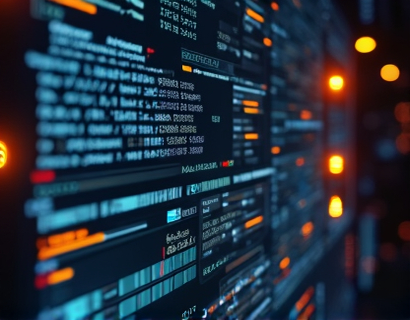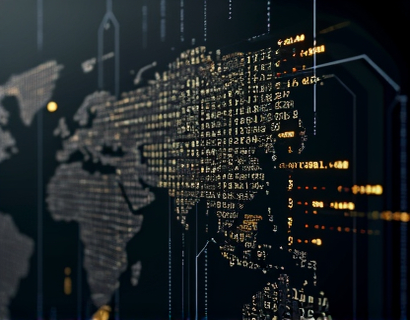The Intersection of AI and Crypto: Transforming Digital Finance
The integration of artificial intelligence (AI) with cryptocurrency is revolutionizing the landscape of digital finance. This synergy is not just a trend but a fundamental shift that is redefining how financial services operate and how users interact with digital assets. The convergence of these two technologies is giving rise to intelligent solutions that promise to enhance security, efficiency, and accessibility in the crypto space. This article delves into the various ways AI is transforming digital finance, exploring the potential and challenges of this powerful combination.
Enhanced Security Through AI
One of the most significant benefits of AI in cryptocurrency is the enhancement of security measures. Traditional cryptographic methods, while robust, are increasingly being challenged by sophisticated cyber threats. AI algorithms can analyze vast amounts of data in real-time to detect anomalies and potential security breaches. Machine learning models are trained to recognize patterns that indicate fraudulent activity, allowing for proactive measures to be taken before any damage occurs. This dynamic monitoring system significantly reduces the risk of hacking and unauthorized access, providing users with a higher level of security.
Moreover, AI-driven security solutions can adapt to new threats more quickly than static systems. By continuously learning from new data, these systems can evolve and improve their defenses, ensuring that the crypto ecosystem remains resilient against emerging threats. This adaptive nature is crucial in a domain where the stakes are high and the landscape is constantly changing.
Improved Trading and Investment Decisions
AI is also transforming the way users make trading and investment decisions in the crypto market. Traditional trading relies heavily on technical analysis and fundamental analysis, which can be time-consuming and prone to human error. AI algorithms can process and analyze vast datasets, including historical price data, market trends, and even social media sentiment, to provide insights and predictions. These insights can help traders and investors make more informed decisions, potentially leading to better returns.
Automated trading bots powered by AI can execute trades based on predefined criteria, operating 24/7 without the need for human intervention. These bots can adjust their strategies in real-time based on market conditions, optimizing performance and minimizing emotional biases that often affect human traders. This level of automation not only increases efficiency but also opens up opportunities for retail investors who may not have the expertise or resources to monitor the market manually.
Smart Contracts and Decentralized Applications
Smart contracts, self-executing contracts with the terms directly written into code, are another area where AI is making a significant impact. When combined with blockchain technology, smart contracts can automate and enforce agreements without the need for intermediaries. AI can enhance smart contracts by adding layers of intelligence, such as predictive analytics and natural language processing, to create more sophisticated and flexible agreements.
Decentralized applications (dApps) are also benefiting from the integration of AI. These applications run on blockchain networks and can leverage AI to provide advanced functionalities, such as personalized user experiences, intelligent matching services, and automated content generation. For instance, a dApp for peer-to-peer lending could use AI to assess creditworthiness more accurately, reducing the risk for both borrowers and lenders.
User Experience and Accessibility
The user experience in the crypto space is being significantly improved through AI. User interfaces can be tailored to individual preferences and behaviors, making the platform more intuitive and user-friendly. Natural language processing (NLP) enables chatbots and virtual assistants to provide real-time support and guidance, helping users navigate complex crypto concepts and transactions. This level of personalization and support is particularly beneficial for newcomers to the space, lowering the barrier to entry and fostering a more inclusive environment.
Moreover, AI can facilitate cross-platform integration, allowing users to seamlessly interact with various crypto services from a single interface. This interconnectedness not only simplifies the user experience but also enhances the overall functionality of crypto applications, making them more versatile and powerful.
Challenges and Considerations
While the integration of AI and crypto offers numerous benefits, it also presents several challenges that need to be addressed. One of the primary concerns is the regulatory landscape. As AI and crypto continue to evolve, regulators are grappling with how to oversee these technologies to prevent misuse and ensure compliance. Clear and adaptive regulations are essential to foster innovation while protecting consumers and maintaining market integrity.
Another challenge is the ethical use of AI. The deployment of AI in finance raises questions about data privacy, algorithmic bias, and transparency. Ensuring that AI systems are designed and implemented ethically is crucial to maintaining trust and credibility in the crypto ecosystem. Developers and organizations must prioritize transparency, fairness, and accountability in their AI applications.
Future Prospects
The future of AI and crypto is promising, with ongoing advancements poised to unlock even more innovative solutions. As AI algorithms become more sophisticated, we can expect to see further improvements in areas such as fraud detection, risk management, and personalized financial services. The integration of AI with other emerging technologies, like quantum computing and the Internet of Things (IoT), could lead to breakthroughs that redefine the financial landscape entirely.
For tech-savvy enthusiasts and innovators, the intersection of AI and crypto represents a fertile ground for exploration and contribution. The potential for creating impactful solutions that enhance the crypto experience is vast, and those who embrace this synergy will be at the forefront of the next financial revolution. Whether through developing new AI-powered tools, exploring decentralized applications, or advocating for ethical and responsible AI practices, there are numerous opportunities to make a meaningful impact in this exciting field.
In conclusion, the combination of AI and cryptocurrency is not just a technological advancement but a transformative force that is reshaping digital finance. By enhancing security, improving trading decisions, revolutionizing smart contracts, and elevating user experiences, AI is opening new avenues for interaction and management in the digital age. As this synergy continues to evolve, it will undoubtedly play a pivotal role in the future of finance, offering endless possibilities for those who are ready to embrace the change.










































